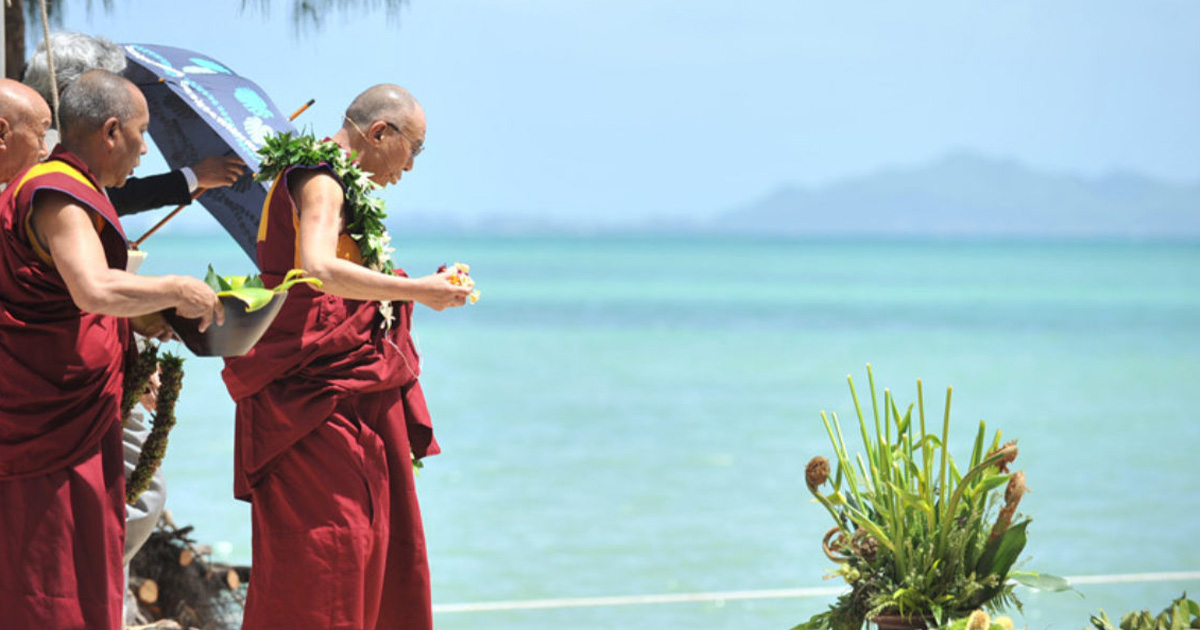
The Dalai Lama during a visit to Hawaii in 2012. The Tibetan spiritual leader has shared his prayers for the victims of the Hawaii wildfires and other recent natural disasters while calling for urgent action on the climate crisis.
The Dalai Lama has offered his prayers to victims of the Hawaii wildfires and other recent natural disasters—including in China and his native Tibet—while urging action on climate change.
“Under these circumstances,” the Tibetan spiritual leader said, “I appeal to my brothers and sisters across the world to pray for all those affected by these natural disasters, and to take whatever steps they can to address the climate crisis and its effects.”
The Dalai Lama’s statement comes as the US State Department is preparing to convene a panel discussion on water security challenges in the Himalayan region, which is home to Tibet.
In 1989, the Dalai Lama became the first person to receive the Nobel Peace Prize specifically for environmental efforts. The award also recognized his nonviolent campaign to resolve the Tibet-China conflict.
Hawaii wildfires
In the wake of the devastating wildfires in Hawaii, the Dalai Lama wrote to Hawaii Governor Josh Green.
“I am particularly sad to learn of the damage caused to the former capital in the wildfire,” His Holiness said in his letter. “I pray that you and the people of Hawaii will find the spiritual strength to deal with this tragedy.”
The Dalai Lama noted that he has traveled to Hawaii several times.
“I deeply appreciate the people of Hawaii’s interest in my efforts to promote basic human values and inter-religious harmony,” he wrote. “Also, in the course of my interaction with the Hawaiian people, I have been touched by their deep devotion to their traditions and heritage.”
“While the damage to buildings may be irreparable,” His Holiness added, “I understand that everything is being done by the federal, State of Hawaii and other agencies to provide necessary help and support to the people affected by this calamity.”
Learn more from the Dalai Lama’s office.
Disasters in Tibet, China, elsewhere
The Dalai Lama’s message to the Hawaii governor followed a statement last week about the “shocking series of natural disasters in many different parts of the world” this year.
“There have been floods, wild fires, and hurricanes that have resulted in a tragic loss of life, as well as damage to property and the natural environment,” His Holiness said in the statement. “Clearly the consequences of global heating affect us all.”
The statement notes that recent flooding in northern China and some Tibetan areas has led to the loss of life and widespread damage to property and the environment. “I pray for those who have lost their lives and express my sympathy and concern to all those affected by this calamity,” the Dalai Lama said in the statement.
His Holiness added that, “as a mark of my solidarity with the people of China, I hope to be able to make a donation to the relief efforts.”
The Chinese government has illegally occupied Tibet for over 60 years, forcing the Dalai Lama into exile in 1959.
Today, Tibet is warming at least twice as fast as the global average while the Chinese government continues to persecute Tibetan environmental defenders.
Read the Dalai Lama’s statement on recent natural disasters.
Water conference panel
Two Tibetan experts based in exile will speak next week at a panel discussion on Himalayan water security at the World Water Week Conference in Stockholm.
“Addressing Water Security Challenges in the Himalayan Region” will take place Aug. 24. The International Water Management Institute will host the panel, which the US Department of State is convening.
Tsechu Dolma, founder of the Mountain Resiliency Project, and Lobsang Yangtso, senior researcher at the International Tibet Network, will speak on the panel alongside Manohara Khadka, the Nepal country representative for the International Water Management Institute. Under Secretary of State Uzra Zeya, who serves as the US Special Coordinator for Tibetan Issues, will provide a prerecorded message for the discussion.
The Himalayan region is home to one-fifth of the world’s freshwater supply, providing water to an estimated 1.8 billion people.
The region’s sustainability is critical to global climate change goals and directly contributes to the stability and economic well-being of downstream nations in South and Southeast Asia. However, large-scale water diversion projects and hydropower development have had dramatic downstream consequences, including lack of access to fresh water and negative ramifications on downstream ecosystems.
During the panel, the panelists will propose policy solutions to speed up progress in different forums related to water, climate change, sustainable energy and water storage in the Himalayas.

